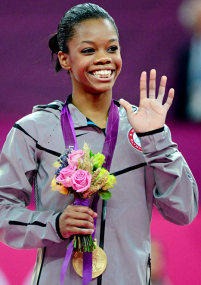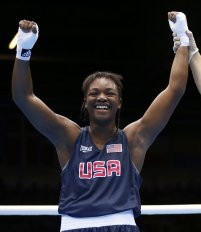 |
| Gabby Douglas |
After Gabby won her gold medal in Women's All around, Bob Costas tried to make a comment referring to her race and not piss a bunch of people off. That is an incredibly difficult task for a successful white guy to do. This was what that endeavor sounded like:
"You know, it's a happy measure of how far we've come that it doesn't seem all that remarkable, but still it's noteworthy, Gabby Douglas is, as it happens, the first African-American to win the women's all-around in gymnastics. The barriers have long since been down, but sometimes there can be an imaginary barrier, based on how one might see oneself."
He was only moderately successful at not pissing people off. I liked his comment, because I think it mentions a new paradigm we are seeing in relations specifically with African American people and, well, basically every other race. Overall, there was very little mention of what color Gabby was over the course of the Olympic coverage up until that point. She wasn't hampered with the burden of raising the respectability of those with her skin color. She was just another girl struggling to do her best in an elite sport. The truth was, I believe most people didn't spend much time at all worrying about what color she was (except for those voicing deep concerns about her hair), because these days it is not uncommon to see African American people in any position, from Walmart cashier, to banker, to artist, to President, to elite athlete. Most of us are used to it. We are all happy for her because she did a great job. Which is a much more beneficial spreading of the glory than having to assign glory to someone merely because they are a certain color and do a good job. What we need to realize is that these days, having to dwell too long on which person is the first African American to do so-and-so can be in itself racist. These days I think bigger separators of people are income, and culture. Culture that almost kept Claressa Shields from becoming the Olympic boxer she is. To paraphrase a recent "Essence," article in my own words. Her mother was a drunk, who associated with men who objectified Claressa, and her father almost completely refused to allow her to train for boxing because he was concerned it would make her less physically attractive. She felt like everyone was against her and her family almost kept her from attaining amazing heights in her sport. I know this is only one instance but this is a perfect example of culture keeping a person from excelling. It wasn't money that put Claressa's future in jeopardy, it was a lack of belief in her dreams by those closest to her. THAT, I think is a bigger deterent to future success than money or race. Something I see over and over in Olympic coverage are images of the families behind the players, and the joy players feel in having their families be there for them and support them. Some families put themsleves in financial hardship in order to see their children in the Olympics. I think we need to shift our thinking. We need to realize that race in and of itself is not the great divider. Money and culture: as in the attitudes we come at life with (ie, Claressa's family's disbelief in her) are going to be the big dividers as we move forward. And yes, these are big problems that need to be addressed. If we keep acting like race is an issue, we will jeopardize African Americans' future advancement. White people will, and sometimes are afraid of stepping on black toes, so they sometimes separate themselves or force themselves to have "token" acquaintances, rather than see African American people as potential equals and friends.
 |
| Claressa Shields |
Gabby did well. Good for her. Good for America. And if the black community now wants to claim her as theirs that is fine, but they must understand the more they distinguish themselves by pointing out that they are different in color the more they encourage others to see them that way. The more they act like it is not normal for them to excel the more people will see it as exceptional when they do. On the other hand, the more they expect their children to do well, even to do the amazing, the less people like Claressa will have to beg and plead their own families for a chance. Who knows how many African American kids or even low income kids of any race didn't have Claressa's tenacity, and were stifled in their dreams by their own community? I hope one day we will be able to admit the flaws in the attitude of racial separation, so that more poeple can truly benefit and excel, even if it is in a way that their culture of birth doesn't sanction. Color is a separator of the past, and the more whites or blacks dwell on what is expected or not expected of the African American community as a group, the more we do young African Americans a disservice by limiting their opportunities.


0 comments:
Post a Comment